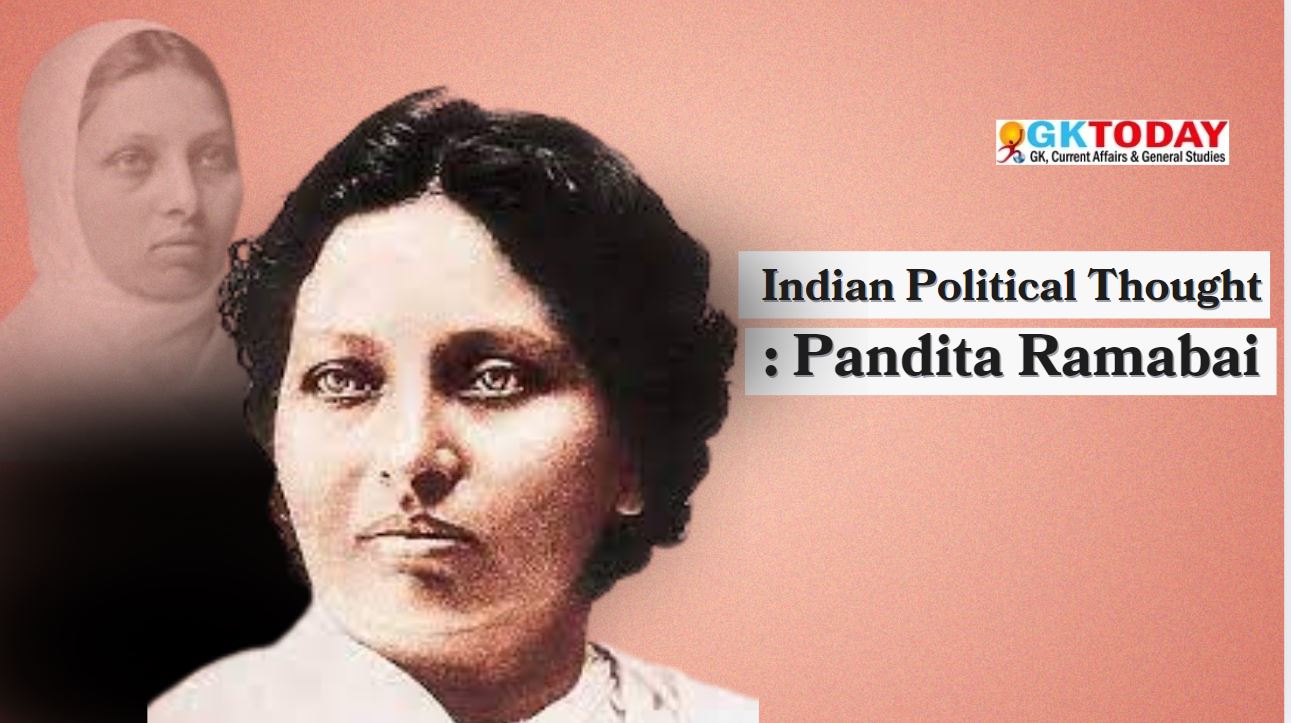Indian Political Thought: Pandita Ramabai
Pandita Ramabai was a prominent figure in the landscape of Indian social reform and women’s rights. Born in 1858 in Maharashtra, she faced numerous societal challenges throughout her life.
Her journey from a Brahmin family to becoming a catalyst for change marks her dedication to education and social justice. Ramabai’s work has left an indelible mark on Indian political thought, particularly concerning women’s empowerment and rights.
Early Life
Pandita Ramabai was born on April 23, 1858, in a Brahmin family in Maharashtra.
- Family Background – Her father, Ramchandra, was a Sanskrit scholar, and her mother, Lakshmibai, played important role in her early education.
- Childhood Challenges – She faced the tragic loss of both parents at a young age. By the age of 16, she became a widow, which subjected her to societal stigma and challenges.
Education
Ramabai was largely self-taught, showing a remarkable aptitude for learning.
- Self-Education – She mastered Sanskrit, English, and several Indian languages, acquiring knowledge in various disciplines.
- Advocacy for Women’s Education – Ramabai strongly believed in the importance of education for women. She established schools specifically for girls, promoting their access to learning.
Contributions to Social Reform
Pandita Ramabai was a fervent advocate for social reform in India.
- Social Reformer – She campaigned for women’s rights, widow remarriage, and education. Her efforts focused on uplifting the status of women in society.
- Literary Contributions – She authored works, including “The High Caste Hindu Woman” (1888). This book critically examined the treatment of women in Hindu society and brought into light the injustices they faced.
- Establishment of Organizations – In 1900, she founded “Mukti Sadan” in Pune, an institution aimed at the education and rehabilitation of widows.
Religious and Philosophical Views
Ramabai’s religious beliefs evolved over her lifetime. – Religious Reform – She challenged orthodox Hindu practices and advocated for a more inclusive and rational approach to spirituality. – Influence of Christianity – In 1883, she converted to Christianity. This decision was controversial but telld her commitment to social justice and equality.
Political Engagement
Pandita Ramabai was actively involved in political movements.
- Participation in Women’s Movements
- She played role in the women’s rights movement in India. Ramabai attended the first session of the Indian National Congress in 1885, advocating for women’s issues.
- Advocacy for Legislative Reforms
- Her efforts included pushing for legal reforms concerning women’s rights, particularly in property ownership and education.
Legacy
Ramabai’s influence continues to resonate in contemporary society.
- Influence on Future Generations – She inspired later feminist movements and social reformers in India, paving the way for future advancements in women’s rights.
- Recognition – Ramabai is remembered as a pioneer in women’s education and rights. Her contributions are acknowledged in various educational institutions and programmes across India.
Key Works
Pandita Ramabai’s literary contributions are .
- The High Caste Hindu Woman – This critical examination of women’s status in Hindu society remains a foundational text in feminist literature.
- Stree Dharma Neeti – This work discusses women’s roles and responsibilities, advocating for their rights.
- The Woman’s Question – In this book, she addresses issues related to women’s rights and education, furthering the discourse on gender equality.
Awards and Honors
Ramabai received posthumous recognition for her contributions. Various educational institutions honour her legacy through programmes focused on women’s rights and education.
Influence on Indian Political Thought
Her work has contributed to Indian political philosophy. – Feminist Perspective – Ramabai’s writings and activism have enriched the discourse on gender equality within Indian political thought. – Integration of Social Reform and Politics – She brought into light the intersection of social issues and political activism, influencing future political movements in India.
Important Dates
A timeline of events in Ramabai’s life:
| Year | Event |
| 1858 | Birth |
| 1883 | Conversion to Christianity |
| 1888 | Publication of “The High Caste Hindu Woman” |
| 1900 | Established “Mukti Sadan” for widows |
Key Themes
Several themes recur in Ramabai’s work:
- Women’s Empowerment – This is a central theme in her advocacy. She promoted education and rights for women, aiming for their upliftment.
- Critique of Patriarchy – Ramabai challenged traditional norms that oppressed women, seeking to dismantle patriarchal structures.
- Social Justice – Her work focused on broader social reform implications, aiming to address the needs of marginalized groups.


